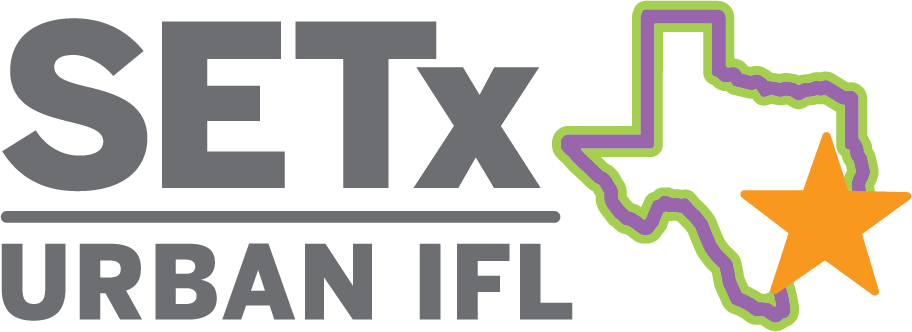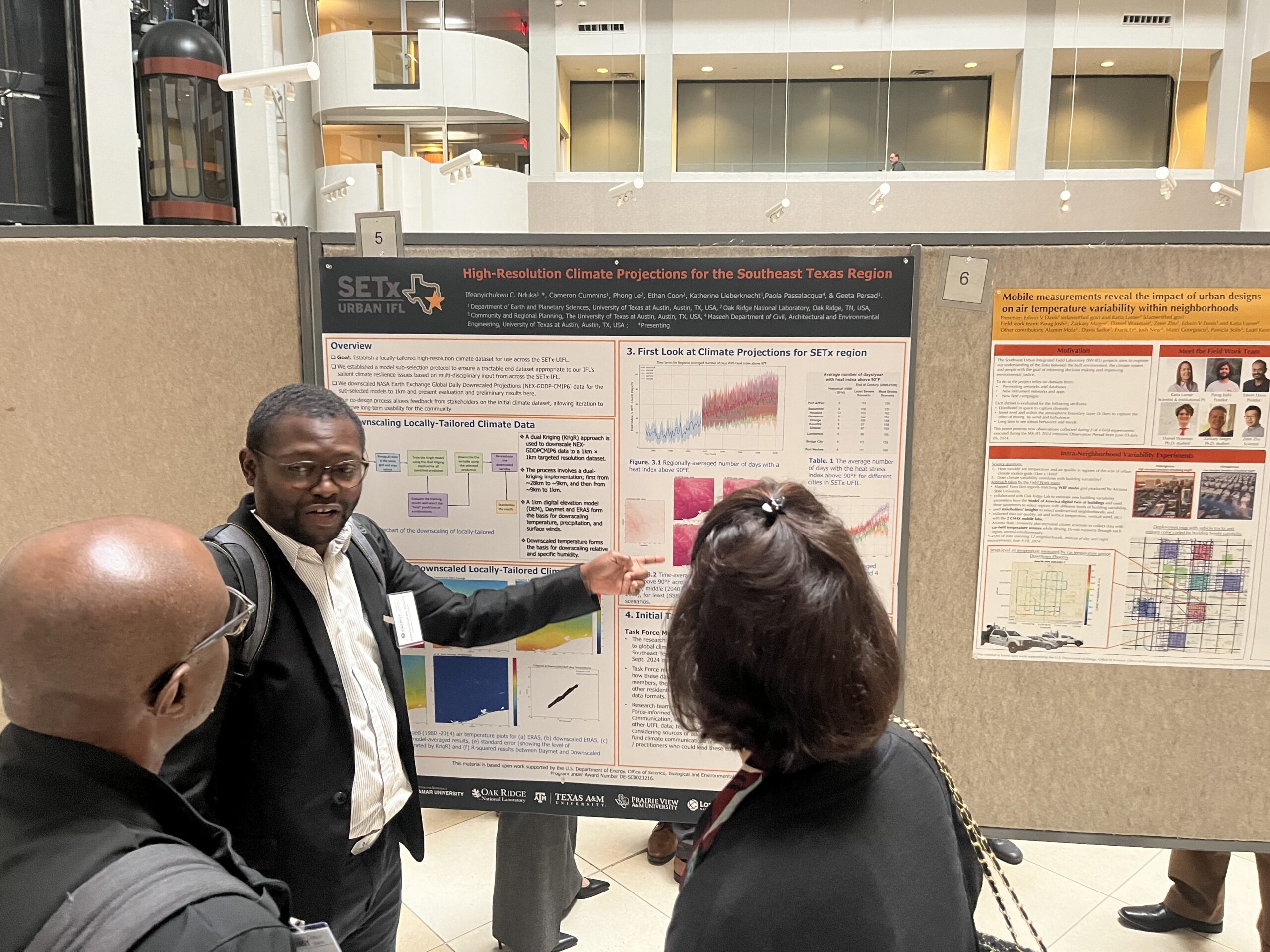By Dr. Maestre, November 17th 2024
The 2024 Principal Investigators Meeting, hosted by the U.S. Department of Energy (DOE), took place on October 27-28 in Rockville, MD, bringing together nearly 100 researchers from the four Urban Integrated Field Laboratories (UIFLs) funded by the DOE. Over two days, participants engaged in dynamic discussions on climate projections, hydrology, air quality, equitable decision-making, and more.
The event began with a welcome and program updates from BER management, followed by a plenary session. Here, the leads from each UIFL—including SETx-UIFL lead Dr. Paola Passalacqua—shared progress from Year 2 and outlined goals for Year 3 of the program.
In her presentation, Dr. Passalacqua provided a comprehensive overview of the Gulf Coast’s social, economic, and environmental context—the central area of the SETx-UIFL work. As a major petrochemical industrial hub, the Gulf Coast ranks among the top 10% most polluted communities in the nation. Recent years have seen rapid urbanization in the region, leading to increased impervious surfaces and heightened risks of flooding. Positioned on the coast, the community contends with multiple sources of flooding, including riverine, rainfall, and coastal surges. These acute stressors are compounded by chronic issues such as air pollution and limited economic resources.
Dr. Passalacqua emphasized that despite these challenges, the community demonstrates significant potential. Residents maintain a deep sense of pride and strong ties to their home, fueling optimism and proactive efforts. For instance, environmental sensors have been installed as part of the community’s commitment to addressing these challenges. The SETx team has cultivated strong relationships with the local population, with many UIFL researchers, including those from partner institutions like Lamar University, working in the area for extended periods. This collaboration has fostered mutual respect and allowed for the successful training of local community members.
Dr. Passalacqua highlighted SETx-UIFL’s focus on critical issues such as flooding and air pollution. Addressing these challenges requires navigating complex interconnections between the natural environment, infrastructure, and community dynamics. To effectively capture regional-scale patterns, the work relies on diverse expertise spanning multiple disciplines. Her multidisciplinary research team was well represented in the event with the attendance and showcase of the work of researchers including Nathanael Rosenheim, Christina Brelsford, Noel Estwick, Ethan Coon, Elena McDonald-Buller, Pawel Misztal, Phong Le, Qin Qian, Clayton Jeffryes, Kerry Kinney and Liv Haselbach, among others.
Dr. Passalacqua also provided updates from the thematic areas of her research center, including:
- Environmental research (climate, water, and air).
- Co-design efforts focused on community engagement and adaptation strategies.
- Equality and resiliency research, which serves as the foundation of social science inquiries.
- A knowledge management platform spearheaded by Will Mobley and Suzanne Pierce, that facilitates data sharing among the research center, stakeholders, and the broader community.
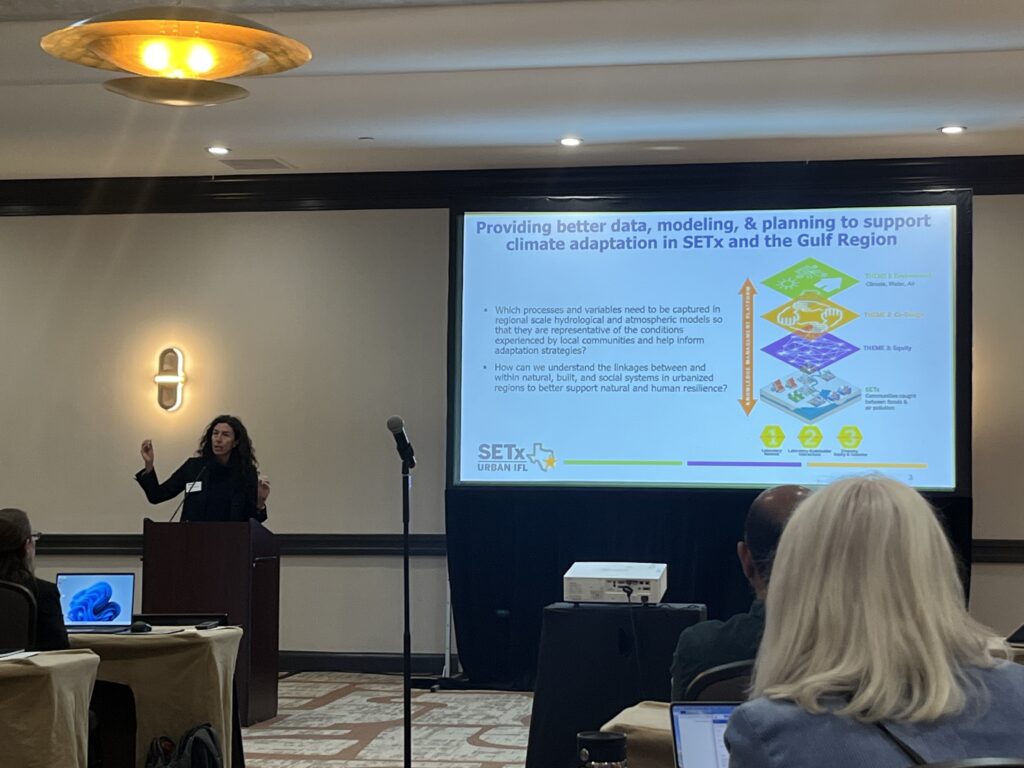
Dr. Passalacqua presenting in the plenary session
Dr. Passalacqua stressed that communities hold invaluable knowledge about their environments. While many residents are already well-informed about flooding events, they often lack specific information on air quality and the chemical compounds involved. “Our research emphasizes the importance of integrating this local knowledge with scientific data, creating a two-way relationship where both parties contribute valuable insights,” she explained.
Highlights from the SETx-UIFL updates included topics such as:
- High-resolution climate datasets and effective stakeholder communication.
- Flood frequency analysis using integrated hydrologic models.
- Land use and land cover forecasting powered by generative AI.
- Real-time detection of air pollution hotspots and their relationships with inequality.
- Studies on outdoor/indoor pollution penetration.
- Community-generated solutions to climate challenges.
- Social vulnerability indices and their connection to health outcomes.
- Data visualization and communication strategies.
- Cross-institutional educational initiatives fostering collaboration.
Another major highlight of the first day was the session on Community and Stakeholder Engagement, which featured a presentation by Dr. Emily Brooks (DOE Fossil Energy and Carbon Management). She discussed critical topics such as the pillars of energy justice, defining the community, the importance of including marginalized voices, two-way engagement strategies, and trust-building processes.
Following the presentation, Brooks led a panel discussion that included the voices of Jeewasmi (Jee) Thapa (SETx-UIFL, Texas A&M University), Ladd Keith (SW-IFL, University of Arizona), Khalia Young (BSEC, Morgan State University), and Katherine Lieberknecht (SETx-UIFL, UT-Austin). The panel explored key aspects of community engagement, including:
- Designing inclusive engagement processes.
- Leveraging team expertise and experience.
- Success stories and lessons learned from their initiatives.
- The importance of meeting communities where they are—both geographically and linguistically.
- Building trust over time and enhancing communication effectiveness.
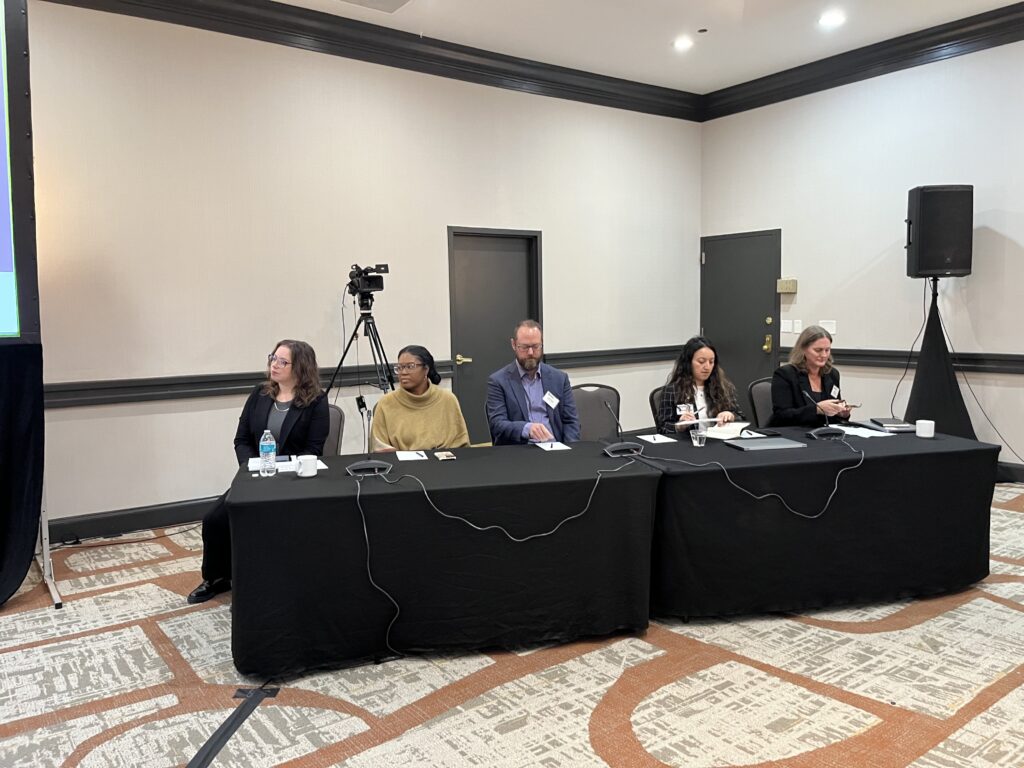
Community engagement panel, from left to right: Dr. Brooks, Dr. Young, Dr. Keith, Dr. Thapa, and Dr. Lieberknecht.
The event continued with more than eight sessions, many featuring up to four concurrent topics. Participants from all four UIFLs discussed advancements in scientific research while emphasizing the importance of community engagement and workforce development to address climate challenges and build community resilience.
This year’s meeting also included two vibrant poster sessions, where over 70 posters, 15 of them from SETx-UIFL, showcased the work of junior and senior researchers. These sessions fostered rich discussions and collaboration ideas.
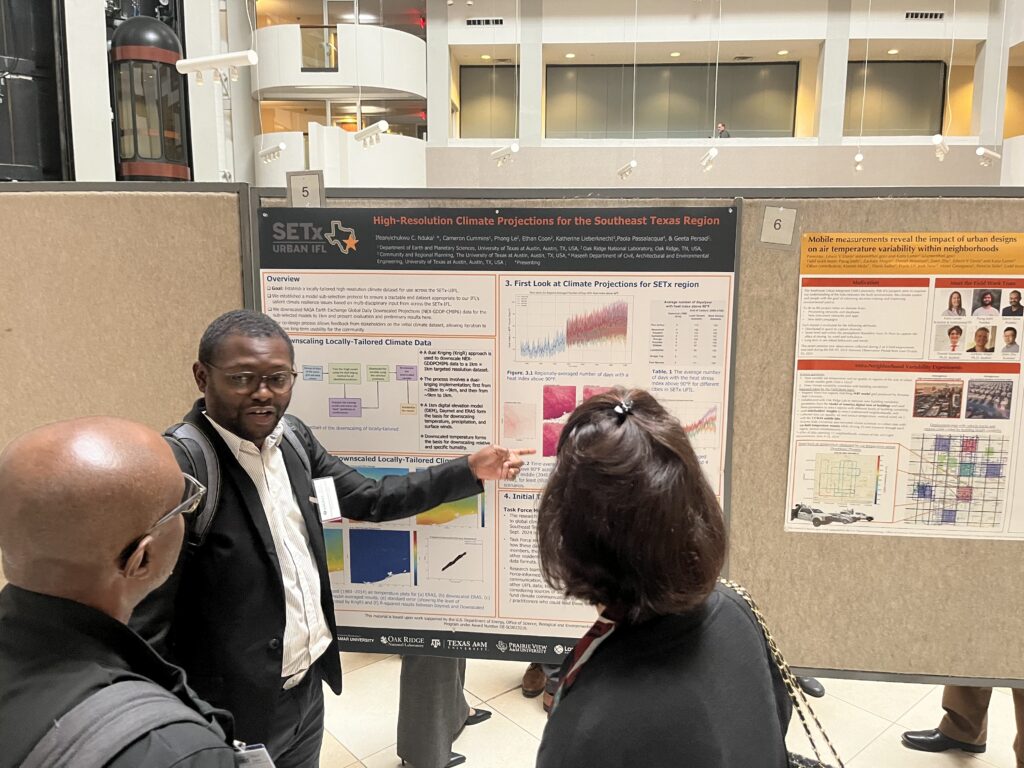
Ifeanyichukwu Nduka (UT-Austin Postdoctoral Researcher) presenting his research poster.
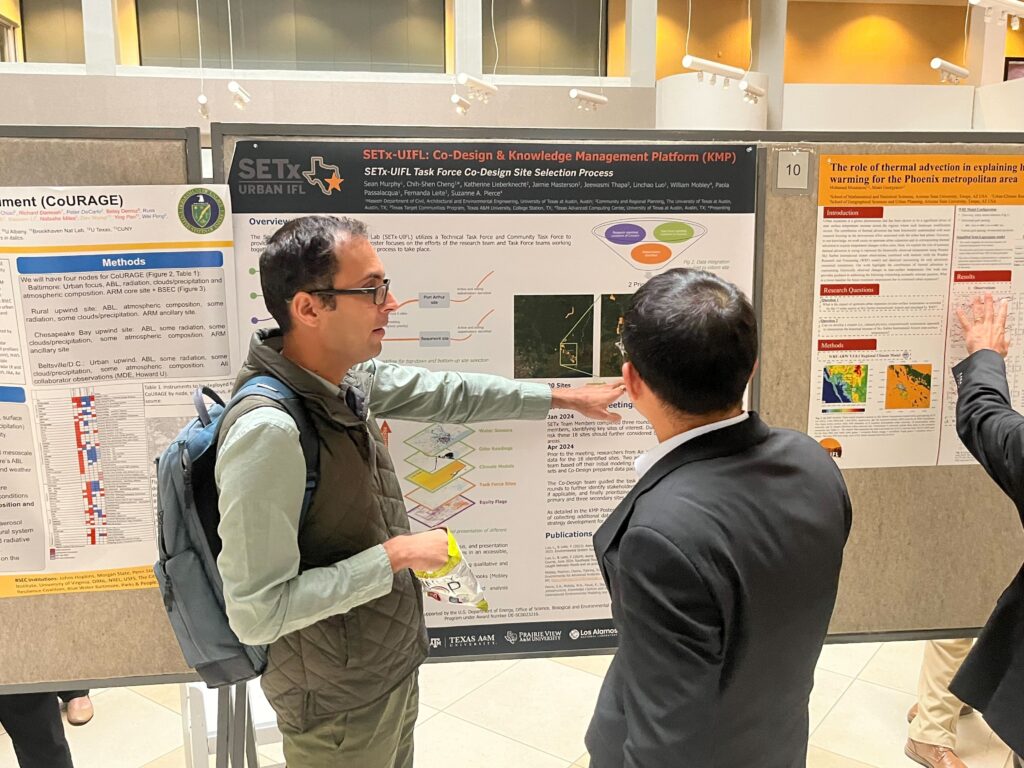
Chih-Shen Cheng (UT-Austin Postdoctoral Researcher) conversing with Saubhagya Rathore (Oak Ridge National Laboratory Co-PI).
Finally, a significant addition to this year’s meeting was the cross-UIFL collaboration sessions. In these, researchers from the four UIFLs strategized joint efforts and set ambitious goals for the coming year, building excitement for their contributions to the 2025 meeting.
